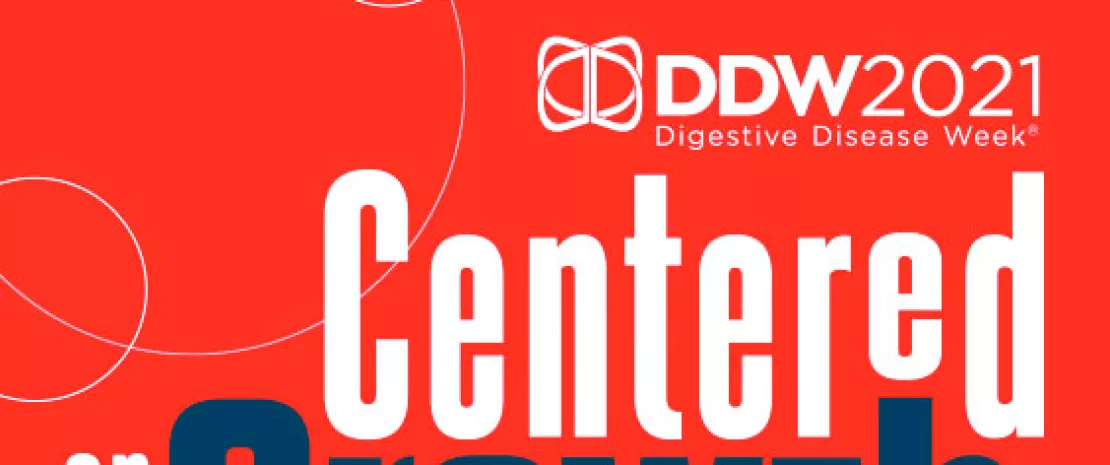DDW congress
Congress Review
By Dr. Ericka Montijo Barrios
Pediatric Gastroenterology and Endoscopist, Department of Gastroenterology and Nutrition, Instituto Nacional de Pediatría, Mexican council NASPGHAN, Mexico city, Mexico
Lay public section
Find here your dedicated section
Sources
This article is based on scientific information
Sections

About this article
Author
The Digestive disease week 2021 moves online this year and was held from May 21-23, 2021. It is the first meeting for physicians and researchers in the fields of gastroenterology, hepatology, endoscopy and surgery. DDW features more than 300 original lecture sessions and interesting posters [1-7].
Microbiota and Functional Gastrointestinal Disease
The gut microbiome can be viewed as a dynamic organ capable of mediating a wide variety of biochemical transformations that directly impact host physiology and disease. A disruption in this equilibrium can lead to alteration of host physiology resulting in disease such as functional gastrointestinal disorders (FGIDs).
Modifying factors in adult microbiota includes psychological stress, infectious gastroenteritis, physical activity, tobacco use, alcohol consumption, antibiotic exposure and the diet (including low fermentable oligosaccharides, disaccharides, monosaccharides and polyols diet). It is well known that antibiotic induced dysbiosis could lead to hyperalgesia. Jones et al. presented that more FGID patients are over prescribed antibiotics relative to non-FGID patients and more than 25% recorded antibiotic within prior their first FGDI diagnosis [4].
Microbial mediators of gastrointestinal motility are: short chain fatty acids (SCFAs) that increase serotonin biosynthesis, increase colonic hypersensitivity and decrease visceral sensitivity; bile acids, promotes propagating and non-propagating colonic contractions, stimulate secretion; methane augments small bowel contractility and slows intestinal transit and hydrogen gas shortens transit.
Gastrointestinal disorders with pain as the key symptoms
Pain in some FGIDs has been attributed to visceral hypersensitivity to mechanical and chemical stimuli. Most of the evidence for a role of the gut microbiome in regulating GI sensation comes from gnotobiotic studies showing that the visceral hypersensitivity phenotype can be transferred after transplantation of gut microbiota from patients with FGIDs into germ free mice.
FGIDs, are the most frequent diseases associated with visceral pain. Inflammatory pain results from the altered activity of ion channels within peripheral nociceptive sensory fibers by inflammatory mediators, which leads to increased excitability and pain. The list of pro-inflammatory mediators includes TNF-α, IL-1β, CCL2, chemokine, ligand 1 and prostaglandin E2. It has been shown that inflammatory pain induced by these mediators is lower in germ-free mice and showed increased levels of the anti- inflammatory cytokine IL-10.
Microbial dysbiosis can trigger a localized immune response associated with the production of dietary antigenic specific IgE antibodies, leading to mast cell mediated hyperalgesia. Bacterial histamine can induce hyperalgesia trough H4R mediated pathways. It is shown that injection of food antigens (gluten, wheat, soy and milk) into the rectosigmoid mucosa of patients with irritable bowel syndrome induced local oedema and mast cell activation.
Conclusion
Antibiotics frequently precede first diagnosis of functional gastrointestinal disorders. There is emerging evidence that small intestinal dysbiosis plays an important role in the pathophysiology of FGIDs. Accumulating data suggest that gut microbiota may play a role in the abdominal pain modulation. Microbial dysbiosis can trigger hyperalgesia inducing low grade inflammation.
1 Shin A, Preidis GA, Shulman R, Kashyap, P. The gut microbiome in adult and pediatric functional gastrointestinal disorders. Clin Gastroenterol Hepatol 2019; 17: 256-74.
2 Santoni M, Miccini F, Battelli N. Gut microbiota, immunity and pain. Immunol Lett 2021; 229: 44-7.
3 Gurusamy S, Shah A, Talley N, et al. Small Intestinal Bacterial Overgrowth in functional Dyspepsia: A systematic review and meta-analysis. DDW ePoster Library 2021; 320192; Sa389.
4 Jones M, Walker M, Holtmann G, et al. Antibiotics frequently precede first diagnosis of functional gastrointestinal disorders. DDW ePoster Library 2021; 319221; Fr071.
5 Bercik P. Host-microbe interactions as a means of understanding visceral hypersensivity. Conference. DDW2021 virtual. May 21-23.
6 Kashyap P. Small Intestinal Bacterial Overgrowth Hype: Role of dietary fiber. Conference. DDW2021 virtual. May 21-23.
7 Microbes and functional GI disease: The science behind the hype. Lecture. DDW2021 virtual. May 21-23.







